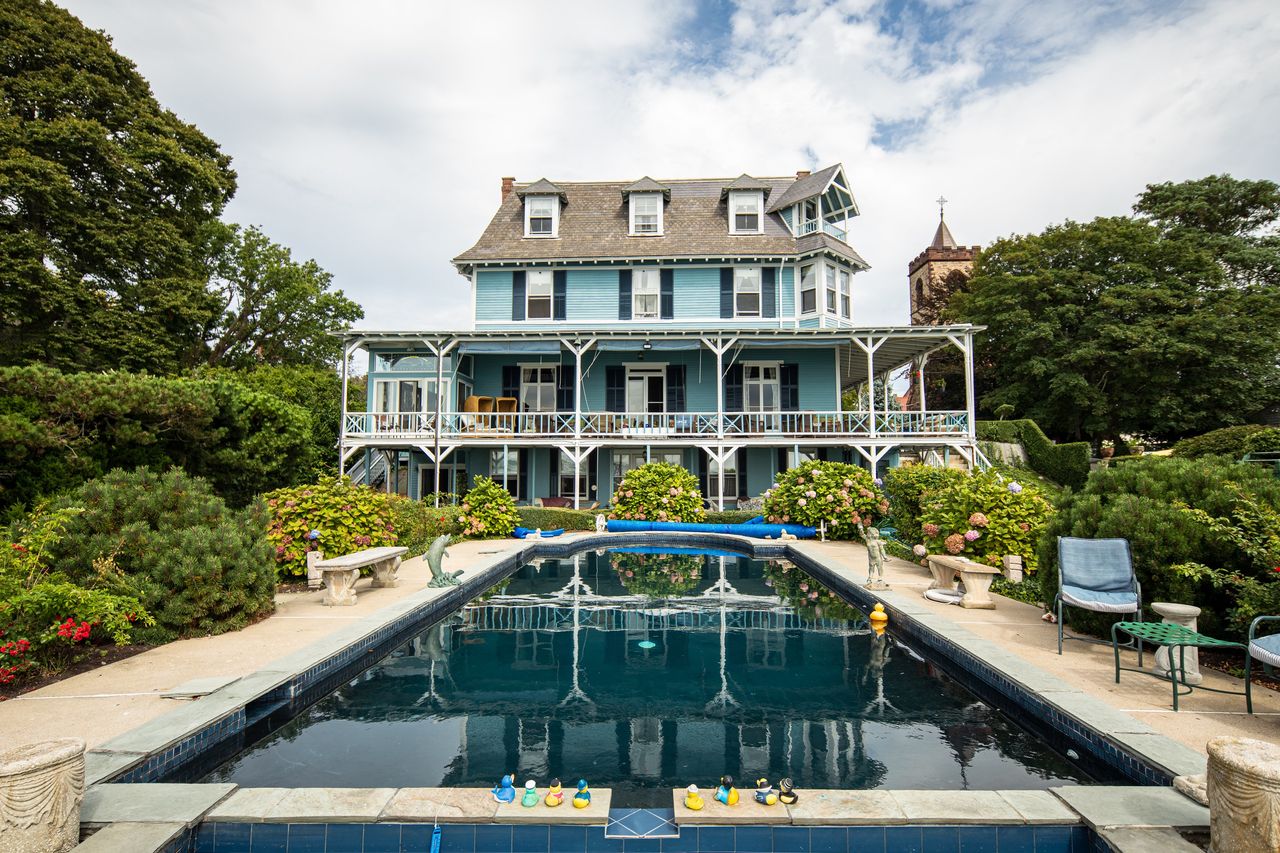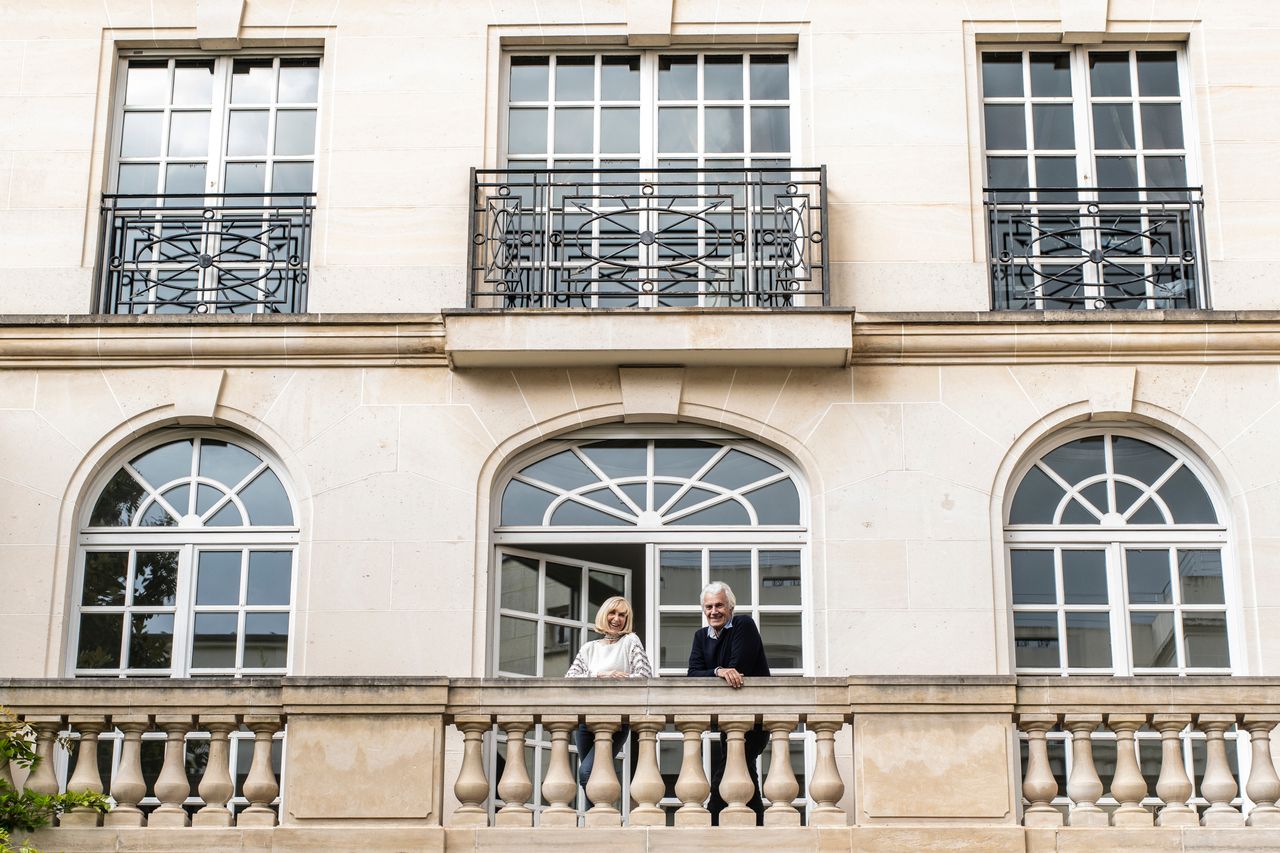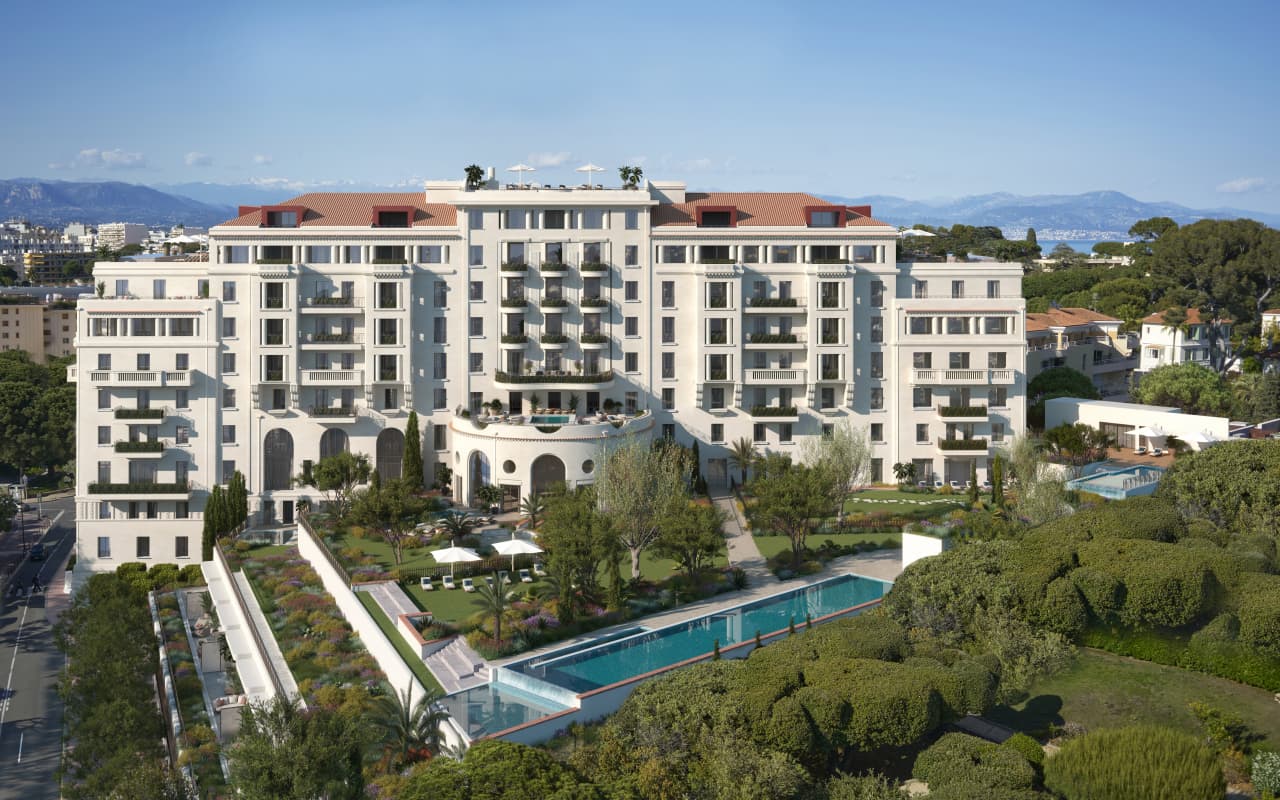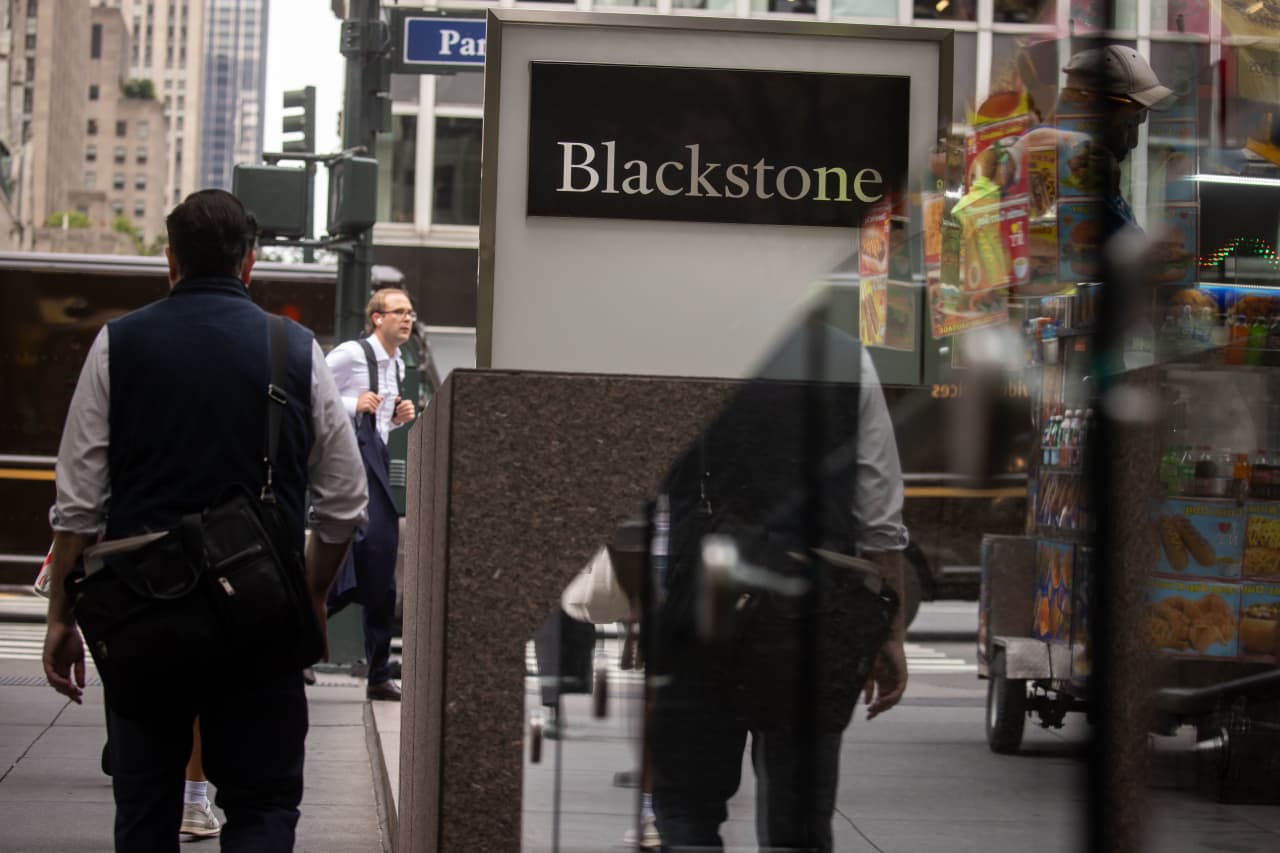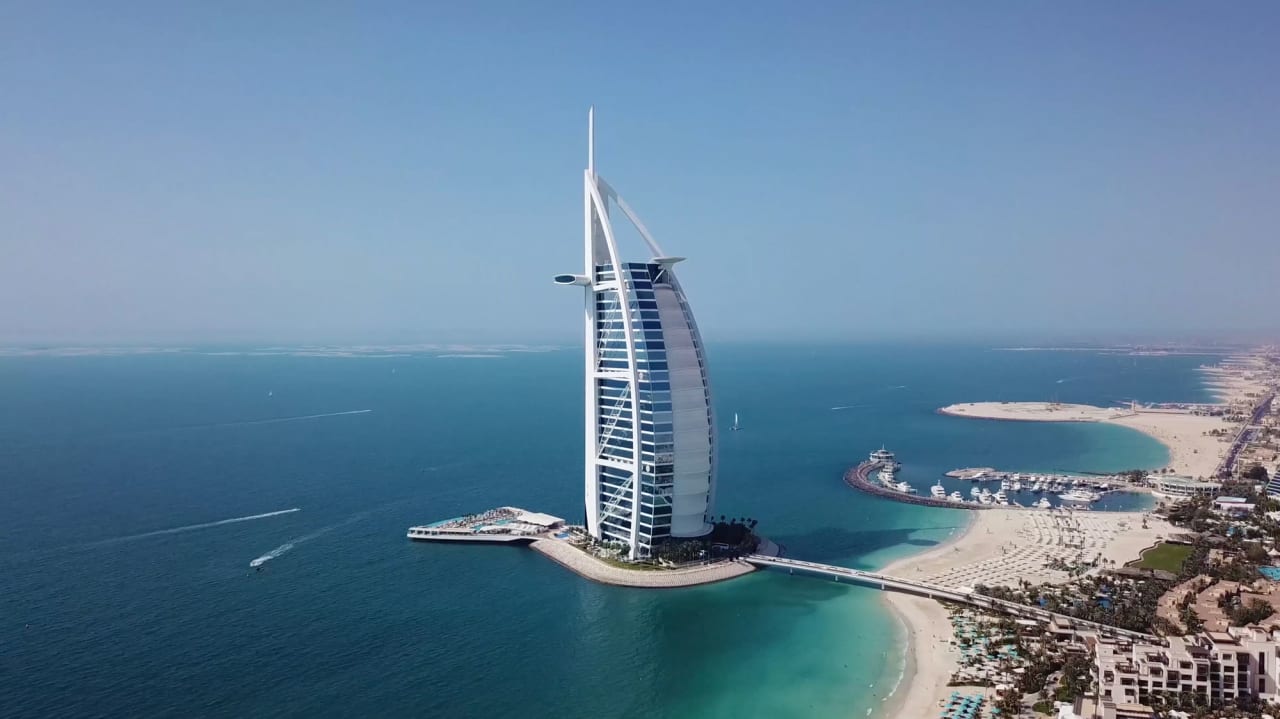Buyers Are Converting B&Bs Into Family Homes
Buyers get the space they crave when Covid-weary bed-and-breakfast owners call it quits.
From the minute Julia and Randall Hesse closed on a rambling Victorian house in suburban Boston last year, their real-estate agent, architect and handyman all issued a warning—change the locks.
For 17 years, their home in Jamaica Plain, Mass., was part of the Taylor House, a popular bed-and-breakfast, the keys to which the former guests and staff could still have. The Hesses heeded the advice, just one of many fixes they are making to convert the roughly 325sqm house into their family home.
Covid-19 dealt a blow to the hospitality industry, forcing some small inns to close for good. But in a tight housing market, some buyers are snagging spacious properties by renovating B&Bs. Often, that means looking beyond kitschy décor and reconfiguring spaces that previously catered to overnight guests.
The Hesses search for a house with character in and around Boston led them to the former Taylor House bed-and-breakfast. “It was beautiful but you couldn’t picture moving into it as it was,” said Mr. Hesse, a 52-year-old former boarding-school teacher. He said the house had six bedrooms, none of which had closets, and six bathrooms. “You had to get out a piece of paper and pencil and start sketching how you would move things to make it work.”
The couple closed in November 2020, paying US$1.85 million. They plan to move in this fall after a roughly $500,000 renovation to add central air and redo the kitchen, among other things. The Hesses said they combined several bedrooms to create a primary bedroom suite with closets. (They will end up with four bedrooms.) They kept five wood-burning fireplaces and a professional-grade water heater, but said they removed a shower in a first-floor bathroom that felt out of place.
“It was right there, right off the dining room, just in case you want to go out from Christmas dinner and take a shower,” said Ms. Hesse, a 48-year-old corporate healthcare lawyer.
Monica Hsu and her husband made a similar decision at their roughly 3,700-square-foot California craftsman house in Sonoma, Calif. The couple paid $3.35 million for the former B&B in March, according to property records. Ms. Hsu, who works in the tech industry, said they redid the floors downstairs and painted the inside of the house. They also closed off a door between the kitchen and master bedroom. “We didn’t need that,” she said.
Ms. Hsu, 37, said they were drawn to the bustling, often-touristy neighbourhood in California wine country. The house is larger than their prior home in the Bay Area, and came with a chef’s kitchen that appealed to her husband, who loves to cook. The kitchen has a Wolf range with six burners and a griddle, a large hood and an extra dishwasher that comes in handy for wine glasses.
The back porch has creature comforts including a fan, space heater and bottle opener on the wall. The former owner “thought of these conveniences for people on vacation, so we’re reaping the benefits,” Ms. Hsu said.
For some current innkeepers, the hot housing market can seem like a golden ticket after a roller coaster of a year in 2020.
In the U.S., B&B revenue plunged 43.7% to roughly US$1.3 billion in 2020, compared with 2019, according to IBISWorld, a research firm. The total number of B&Bs also dropped by around 1,400 to roughly 7,340.
Although travel has rebounded, Covid-19 forced some proprietors to rethink their business, said hospitality consultant Christine Gustafson. “It caused all of us to just pause and think about what we’re doing with our lives,” she said.
That is the case with Rick and Suzanne Weichert, who bought the Jabberwock Inn in Monterey, Calif., for $2.38 million in 2014, property records show. After being forced to close for 4½ months last year, they listed the roughly 445sqm home for $4.95 million, according to Zillow. The property is being marketed as a single-family home.
“It was an insanely difficult year,” said Mrs. Weichert, 56. Although business has rebounded, she said the future remains uncertain. The couple’s roughly half-acre property is one of the largest in the area, and she said they think they may attract a buyer from the Bay Area who can now work remotely and wants more space.
Selena Einwechter, who owns the Bed & Breakfast on Tiffany Hill, an inn near Asheville, N.C., is also enticed by the idea of cashing out in a strong housing market. “You don’t work this hard at doing a B&B all these years…to let the real-estate value diminish in front of your eyes,” she said. Ms. Einwechter, 66, said her brother died due to complications of Covid, and that also served as a “wake-up call,” prompting her to re-evaluate her priorities.
Ms. Einwechter purchased her roughly 6-acre property for $200,000 in 2008 and spent around $2.2 million over the years to build a roughly 4,700-square-foot house with five guest suites, and a carriage house with two guest suites. She also built a roughly 2,200-square-foot owner’s residence on the property that she lives in. The main residence and carriage house are listed for $3.45 million, according to Zillow. Her home is not listed.
Ms. Einwechter said she’s marketing the main house as a single-family property because she’s not comfortable with the idea of selling a brand she worked hard to build. “When you sell a B&B, you are selling your guest list, your business…[and] your reputation,” along with every fork and knife in the place, she said.
Dave Elliott co-owned the two properties that made up the Taylor House B&B in Jamaica Plain, one of which was purchased by the Hesses. He said running a B&B was never a moneymaker, even before Covid hit.
The inn had 11 guest suites in two adjacent properties, purchased separately for $310,000 in 1995 and $800,000 in 2003. Mr. Elliott, 66, and his co-owner, Daryl Bichel, 71, sold the properties in November, the first for roughly $2.6 million and the second to the Hesses for $1.85 million. Mr. Elliott said he is debt free for the first time in 25 years. “Fortunately, the properties went up in value,” he said. “The only profit we got from the business was when we sold it.”
When they owned the properties, the co-owners obtained easements to create a shared driveway for the business. As part of the sale, Mr. Elliott said the buyers asked them to cancel the easements and re-establish a property line separating the homes.
In Newport, R.I., that is the kind of outcome Anne Ramsey Cuvelier is hoping she gets if she sells her roughly 706sqm inn. The B&B, known as the Sanford-Covell Villa Marina, is listed for $6.9 million. Built-in 1870, the Victorian home has eight bedrooms, a 3-metre entrance hall and wraparound front porch.
Ms. Cuvelier, 87, said she paid around $60,000 for the property in 1980 and ran a successful business for 41 years, but during the pandemic “it was just a little bit too hard to hang on.” She said she borrowed against her credit card, racking up $50,000 to $60,000 in debt.
Paul Leys of Gustave White Sotheby’s International Realty is marketing the property. He said Ms. Cuvelier’s house is “worth more money on the open market as a residence” since it has both a pool and dock access. He said the small, galley kitchen needs considerable work and the house lacks central air.
In Jamaica Plain, Ms. Hesse said she assumes other buyers had trouble envisioning what the house would look like when renovated, or it is possible they were turned off by the prospect of renovating, something she and her husband relished. “The bones of the house were so good,” she said. “We were definitely motivated.”
In Sonoma, the Hsus had few reservations about buying a former B&B because the property checked so many other boxes, including being close to town. Ms. Hsu said before they bought the property, they looked it up on Tripadvisor. The reviews were good.
Reprinted by permission of The Wall Street Journal, Copyright 2021 Dow Jones & Company. Inc. All Rights Reserved Worldwide. Original date of publication: 1 September, 2021.
 Copyright 2020, Dow Jones & Company, Inc. All Rights Reserved Worldwide. LEARN MORE
Copyright 2020, Dow Jones & Company, Inc. All Rights Reserved Worldwide. LEARN MORE
This stylish family home combines a classic palette and finishes with a flexible floorplan
Just 55 minutes from Sydney, make this your creative getaway located in the majestic Hawkesbury region.
Ahead of the Games, a breakdown of the city’s most desirable places to live
PARIS —Paris has long been a byword for luxurious living. The traditional components of the upscale home, from parquet floors to elaborate moldings, have their origins here. Yet settling down in just the right address in this low-rise, high-density city may be the greatest luxury of all.
Tradition reigns supreme in Paris real estate, where certain conditions seem set in stone—the western half of the city, on either side of the Seine, has long been more expensive than the east. But in the fashion world’s capital, parts of the housing market are also subject to shifting fads. In the trendy, hilly northeast, a roving cool factor can send prices in this year’s hip neighborhood rising, while last year’s might seem like a sudden bargain.
This week, with the opening of the Olympic Games and the eyes of the world turned toward Paris, The Wall Street Journal looks at the most expensive and desirable areas in the City of Light.
The Most Expensive Arrondissement: the 6th
Known for historic architecture, elegant apartment houses and bohemian street cred, the 6th Arrondissement is Paris’s answer to Manhattan’s West Village. Like its New York counterpart, the 6th’s starving-artist days are long behind it. But the charm that first wooed notable residents like Gertrude Stein and Jean-Paul Sartre is still largely intact, attracting high-minded tourists and deep-pocketed homeowners who can afford its once-edgy, now serene atmosphere.
Le Breton George V Notaires, a Paris notary with an international clientele, says the 6th consistently holds the title of most expensive arrondissement among Paris’s 20 administrative districts, and 2023 was no exception. Last year, average home prices reached $1,428 a square foot—almost 30% higher than the Paris average of $1,100 a square foot.
According to Meilleurs Agents, the Paris real estate appraisal company, the 6th is also home to three of the city’s five most expensive streets. Rue de Furstemberg, a secluded loop between Boulevard Saint-Germain and the Seine, comes in on top, with average prices of $2,454 a square foot as of March 2024.
For more than two decades, Kyle Branum, a 51-year-old attorney, and Kimberly Branum, a 60-year-old retired CEO, have been regular visitors to Paris, opting for apartment rentals and ultimately an ownership interest in an apartment in the city’s 7th Arrondissement, a sedate Left Bank district known for its discreet atmosphere and plutocratic residents.
“The 7th was the only place we stayed,” says Kimberly, “but we spent most of our time in the 6th.”
In 2022, inspired by the strength of the dollar, the Branums decided to fulfil a longstanding dream of buying in Paris. Working with Paris Property Group, they opted for a 1,465-square-foot, three-bedroom in a building dating to the 17th century on a side street in the 6th Arrondissement. They paid $2.7 million for the unit and then spent just over $1 million on the renovation, working with Franco-American visual artist Monte Laster, who also does interiors.
The couple, who live in Santa Barbara, Calif., plan to spend about three months a year in Paris, hosting children and grandchildren, and cooking after forays to local food markets. Their new kitchen, which includes a French stove from luxury appliance brand Lacanche, is Kimberly’s favourite room, she says.
Another American, investor Ashley Maddox, 49, is also considering relocating.
In 2012, the longtime Paris resident bought a dingy, overstuffed 1,765-square-foot apartment in the 6th and started from scratch. She paid $2.5 million and undertook a gut renovation and building improvements for about $800,000. A centrepiece of the home now is the one-time salon, which was turned into an open-plan kitchen and dining area where Maddox and her three children tend to hang out, American-style. Just outside her door are some of the city’s best-known bakeries and cheesemongers, and she is a short walk from the Jardin du Luxembourg, the Left Bank’s premier green space.
“A lot of the majesty of the city is accessible from here,” she says. “It’s so central, it’s bananas.” Now that two of her children are going away to school, she has listed the four-bedroom apartment with Varenne for $5 million.
The Most Expensive Neighbourhoods: Notre-Dame and Invalides
Garrow Kedigian is moving up in the world of Parisian real estate by heading south of the Seine.
During the pandemic, the Canada-born, New York-based interior designer reassessed his life, he says, and decided “I’m not going to wait any longer to have a pied-à-terre in Paris.”
He originally selected a 1,130-square-foot one-bedroom in the trendy 9th Arrondissement, an up-and-coming Right Bank district just below Montmartre. But he soon realised it was too small for his extended stays, not to mention hosting guests from out of town.
After paying about $1.6 million in 2022 and then investing about $55,000 in new decor, he put the unit up for sale in early 2024 and went house-shopping a second time. He ended up in the Invalides quarter of the 7th Arrondissement in the shadow of one Paris’s signature monuments, the golden-domed Hôtel des Invalides, which dates to the 17th century and is fronted by a grand esplanade.
His new neighbourhood vies for Paris’s most expensive with the Notre-Dame quarter in the 4th Arrondissement, centred on a few islands in the Seine behind its namesake cathedral. According to Le Breton, home prices in the Notre-Dame neighbourhood were $1,818 a square foot in 2023, followed by $1,568 a square foot in Invalides.
After breaking even on his Right Bank one-bedroom, Kedigian paid $2.4 million for his new 1,450-square-foot two-bedroom in a late 19th-century building. It has southern exposures, rounded living-room windows and “gorgeous floors,” he says. Kedigian, who bought the new flat through Junot Fine Properties/Knight Frank, plans to spend up to $435,000 on a renovation that will involve restoring the original 12-foot ceiling height in many of the rooms, as well as rescuing the ceilings’ elaborate stucco detailing. He expects to finish in 2025.
Over in the Notre-Dame neighbourhood, Belles demeures de France/Christie’s recently sold a 2,370-square-foot, four-bedroom home for close to the asking price of about $8.6 million, or about $3,630 a square foot. Listing agent Marie-Hélène Lundgreen says this places the unit near the very top of Paris luxury real estate, where prime homes typically sell between $2,530 and $4,040 a square foot.
The Most Expensive Suburb: Neuilly-sur-Seine
The Boulevard Périphérique, the 22-mile ring road that surrounds Paris and its 20 arrondissements, was once a line in the sand for Parisians, who regarded the French capital’s numerous suburbs as something to drive through on their way to and from vacation. The past few decades have seen waves of gentrification beyond the city’s borders, upgrading humble or industrial districts to the north and east into prime residential areas. And it has turned Neuilly-sur-Seine, just northwest of the city, into a luxury compound of first resort.
In 2023, Neuilly’s average home price of $1,092 a square foot made the leafy, stately community Paris’s most expensive suburb.
Longtime residents, Alain and Michèle Bigio, decided this year is the right time to list their 7,730-square-foot, four-bedroom townhouse on a gated Neuilly street.
The couple, now in their mid 70s, completed the home in 1990, two years after they purchased a small parcel of garden from the owners next door for an undisclosed amount. Having relocated from a white-marble château outside Paris, the couple echoed their previous home by using white- and cream-coloured stone in the new four-story build. The Bigios, who will relocate just back over the border in the 16th Arrondissement, have listed the property with Emile Garcin Propriétés for $14.7 million.
The couple raised two adult children here and undertook upgrades in their empty-nester years—most recently, an indoor pool in the basement and a new elevator.
The cool, pale interiors give way to dark and sardonic images in the former staff’s quarters in the basement where Alain works on his hobby—surreal and satirical paintings, whose risqué content means that his wife prefers they stay downstairs. “I’m not a painter,” he says. “But I paint.”
The Trendiest Arrondissement: the 9th
French interior designer Julie Hamon is theatre royalty. Her grandfather was playwright Jean Anouilh, a giant of 20th-century French literature, and her sister is actress Gwendoline Hamon. The 52-year-old, who divides her time between Paris and the U.K., still remembers when the city’s 9th Arrondissement, where she and her husband bought their 1,885-square-foot duplex in 2017, was a place to have fun rather than put down roots. Now, the 9th is the place to do both.
The 9th, a largely 19th-century district, is Paris at its most urban. But what it lacks in parks and other green spaces, it makes up with nightlife and a bustling street life. Among Paris’s gentrifying districts, which have been transformed since 2000 from near-slums to the brink of luxury, the 9th has emerged as the clear winner. According to Le Breton, average 2023 home prices here were $1,062 a square foot, while its nearest competitors for the cool crown, the 10th and the 11th, have yet to break $1,011 a square foot.
A co-principal in the Bobo Design Studio, Hamon—whose gut renovation includes a dramatic skylight, a home cinema and air conditioning—still seems surprised at how far her arrondissement has come. “The 9th used to be well known for all the theatres, nightclubs and strip clubs,” she says. “But it was never a place where you wanted to live—now it’s the place to be.”
With their youngest child about to go to college, she and her husband, 52-year-old entrepreneur Guillaume Clignet, decided to list their Paris home for $3.45 million and live in London full-time. Propriétés Parisiennes/Sotheby’s is handling the listing, which has just gone into contract after about six months on the market.
The 9th’s music venues were a draw for 44-year-old American musician and piano dealer, Ronen Segev, who divides his time between Miami and a 1,725-square-foot, two-bedroom in the lower reaches of the arrondissement. Aided by Paris Property Group, Segev purchased the apartment at auction during the pandemic, sight unseen, for $1.69 million. He spent $270,000 on a renovation, knocking down a wall to make a larger salon suitable for home concerts.
During the Olympics, Segev is renting out the space for about $22,850 a week to attendees of the Games. Otherwise, he prefers longer-term sublets to visiting musicians for $32,700 a month.
Most Exclusive Address: Avenue Junot
Hidden in the hilly expanses of the 18th Arrondissement lies a legendary street that, for those in the know, is the city’s most exclusive address. Avenue Junot, a bucolic tree-lined lane, is a fairy-tale version of the city, separate from the gritty bustle that surrounds it.
Homes here rarely come up for sale, and, when they do, they tend to be off-market, or sold before they can be listed. Martine Kuperfis—whose Paris-based Junot Group real-estate company is named for the street—says the most expensive units here are penthouses with views over the whole of the city.
In 2021, her agency sold a 3,230-square-foot triplex apartment, with a 1,400-square-foot terrace, for $8.5 million. At about $2,630 a square foot, that is three times the current average price in the whole of the 18th.
Among its current Junot listings is a 1930s 1,220-square-foot townhouse on the avenue’s cobblestone extension, with an asking price of $2.8 million.
This stylish family home combines a classic palette and finishes with a flexible floorplan
Just 55 minutes from Sydney, make this your creative getaway located in the majestic Hawkesbury region.









